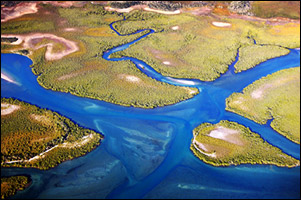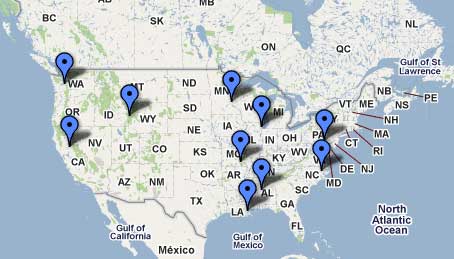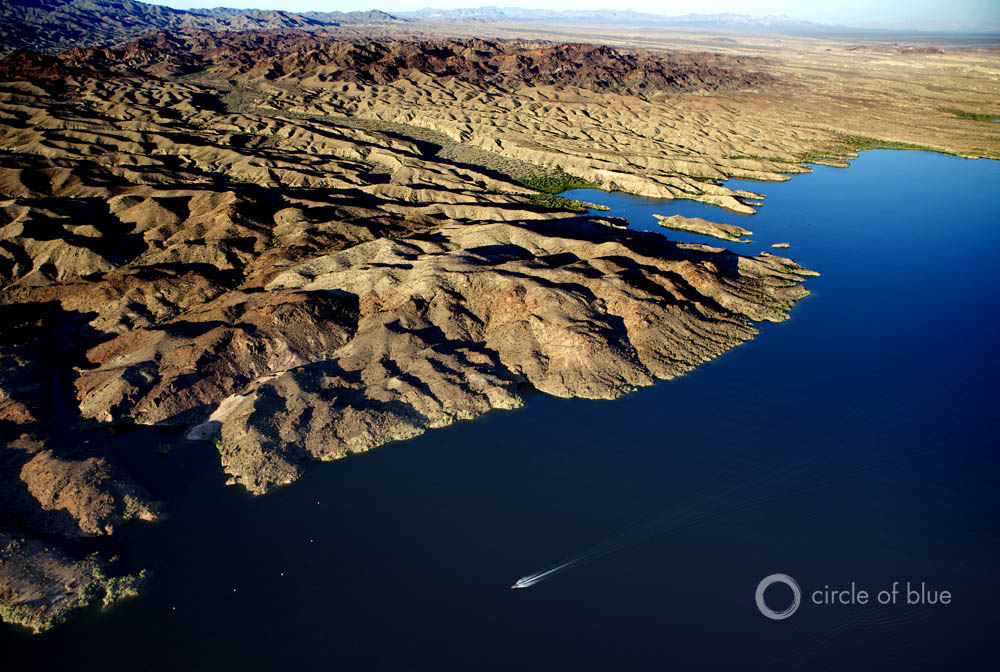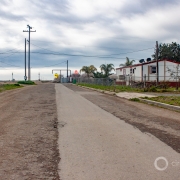Peter Gleick: Whose Water Is It? Water Rights in the Age of Scarcity

Who “owns” what water? Or, if water belongs to the public, who has the right to use it?
This question is perhaps the thorniest question in the world of water. The answer is critical to California’s growing water crisis. It is critical to water in the western U.S. It is critical to the spat between Alabama, Georgia and Florida over the Apalachicola-Chattahoochee-Flint river system (say that three times fast). It is critical to Egypt and the nine other nations that share the Nile. It is critical to the Israelis, Palestinians, Jordanians, Lebanese and Syrians who share the tiny Jordan River. It is critical to disputes among users of water around the world.
And feelings run high. Just last week, Governor Sonny Purdue of Georgia said that Georgia has a right to all the water that originates in the state and that falls in the state and will fight to keep it. “The state of Georgia is due the use of that water, and we will make use of that water,” the governor said. He was responding to a recent major court ruling that said that Georgia is using more water than it should under current law and agreements, depriving Florida and Alabama of its equitable share. I wrote about this in my July 17 post.
This is an old idea — the water falls here or runs through here, so why can’t I use all of it? At the grandest scale, this idea is called “The Harmon Doctrine,” which says that upstream water users have the right to do whatever they want with the water in their own “territory” no matter what harm it causes to downstream users. It was named after a U.S. Attorney General in the 1890s who said that Mexico had no right to any water that originates in the U.S., even if the river flows into Mexico. The only problem for Governor Purdue, and Georgia, is that the Harmon Doctrine has been universally repudiated: in international law, in U.S. law, and in any ethical or moral set of rules.
Water Number: 3
Of all the world’s nations, only three voted “no” on the Convention on the Law of the Non-navigational Uses of International Watercourses — an international agreement on how to share water resources. All three (Burundi, China and Turkey) are upstream nations that want to apply the Harmon Doctrine on their major rivers to the detriment of their downstream neighbors.
Just think about what it would mean to apply the Harmon Doctrine. Egypt would have no right to any of the water of the Nile, which originates entirely in the upstream nations (including Burundi). Yet the Nile supplies 97 percent of Egypt’s water. California, Nevada, Arizona, New Mexico, Utah would have no right to any Colorado River water (except tiny flows that join the river lower down) because most of it comes from the Rocky Mountains in Colorado. Turkey would not have to deliver a drop of water to the Tigris and Euphrates rivers, which also sustain Syria and Iraq. China wouldn’t have to share their flows of the Mekong, the Ganges/Brahmaputra, the Salween, and the other major rivers that sustain billions of people in Asia. That is a recipe for chaos and, frankly, war. All rational water laws and management policies have long acknowledged that downstream parties have rights.
But upstream parties have rights too. The opposite idea of the Harmon Doctrine — that upstream states have no right to use water that would flow naturally to downstream users (the concept of “absolute territorial integrity”) — is also universally repudiated. And so what are we left with? Laws, customs and traditions that require us to actually talk with each other, to discuss and negotiate how to manage and efficiently use shared water resources. The seven Colorado River states have an agreement for sharing, and we have a treaty with Mexico. The Israelis and the Jordanians have a water agreement. The Nile River basin countries are talking about a new sharing arrangement. These agreements are imperfect, but they are far better than no agreements at all, and imperfect agreements can be improved.
It is time for Georgia, or China, or any water users in places where water is no longer abundant to stop posturing and start discussing how to share our rivers and our groundwater too. Just because you are first on a river, or upstream, or own a piece of land with groundwater does not mean that you have no responsibilities to other users, including non-human users, sharing the same watershed. Your use affects others. We may believe that these water resources are not connected to each other or that the use by one person has no effect on their neighbors or that the first user should have senior rights forever. And in the past this may have worked. But if we continue to use 20th century rules to solve 21st century water problems, conflicts over water will only worsen.
[For those interested in the history of water conflicts, a 5000-year long chronology can be found at www.worldwater.org or search for the Water Conflict Chronology.]
Dr. Gleick’s blog posts are provided in cooperation with the SFGate. Previous posts can be found here.












I would like to say that, although you, Dr. Gleick, have given your perspective on International Water Rights, I must express the fact that you failed to mention the first users rights to waters which has been recognized in court opinions for some time. I am mainly refering to the Native American Communities in the US, Canada and Mexico. I think we need to keep in mind we “The Native American (Indian)” have long been denied those rights and we continually have to fight to secure even the basic amount of water needed to sustain life and property.
Yes, “Who Owns the Water?” is a critical question and, depending on ownership, use, or location of the claimant, the question can be difficult or easy.
Water has been considered publicly owned by most societies, at least those who embrace notions of ownership, for 2000 years. The transfer of water from “public” to “private” by the sovereign state that owns the water requires an express authorization by the government, typically by legislative action or in the case of dictatorship or other forms of government an equivalent action that promotes the health, safety, and general welfare — i.e. some public purpose.
However, the sovereign ownership of water, where it falls and/or flows, is inherently subject to the use of the water by others – either an overriding public or private use within the sovereign jurisdiction or by a jurisdiction or its users who are downstream.
In the first instance, notions like the public trust doctrine operate as a limit on private exploitation on use within a jurisdiction that impairs the public interest in the water or harms the water.
In the second instance, notions like riparianism, reasonable use, allocation, or appropriation and absolute capture come into play. These are use rules between private and/or public users on a flowing stream or on a the surface water of a lake with multiple jurisdictions bordering them. These uses are often sorted by principles of protecting the integrity of flows and levels from headwaters to the mouth of a river or protecting the levels of a lake, because it is viewed as a commons of sorts, and the commons, no matter what the use is to be protected. Of course, this is given lip service in most jurisdictions, except in varying degrees riparian law systems in the Eastern U.S.
Hence, reasonable use and/or allocation with principles of harm, beneficial use, and balancing of interests come into play with most use analysis or decisions over water disputes. This, of course, must be considered not only in the context of use, but in rights to own, sell, or export water beyond what the stream or lake does naturally.
In this latter instance, the use of balancing, reasonable use, and allocation actually involve transfer or diversion and ownership decisions. In these cases, it is critical to understand this, for that is where a sovereign jurisdiction can refuse to shift ownership of its rights or ownership in the water as a sovereign state or as public. Subject to the use rules for those jurisdictions who share a river or lake in common, any demand for transfer beyond these rules would require explicit and valid legislative or other action by the jurisdiction from which the water is proposed to be withdrawn or transferred. It is at this point, where states like Georgia or the Great Lakes states in the U.S. under the Great Lakes Compact or public trust doctrine can refuse to allow private ownership, control, and diversion or export without claim on their right to refuse to do so by any other state or person, so long as the refusal is applied equally to those within and without the jurisdiction. E.g., a ban on private control, ownership, and sale of water in containers can be sustained as long as it applies to everyone inside and outside the state or watershed in question.
In summary, I would suggest there are two interrelated tiers of analysis. The first, the fact of public ownership and extent of public trust; the second, the use subject to public ownership and public trust or, inversely, the public ownership and trust tempered by the rights of others who use a stream, river, or lake or other water body based on shared rights in a common watershed or basin.
Of course, any water use that would involve diversion or export out of a common watershed or basin, shared by persons or states, is a different matter and would in my view be subject to express consent consistent with public trust and use rules on the part of all affected jurisdictions in the watershed or basin.
hi
fabulous article, i”m a journalist at water.ca we have interviews,a boil water advisory map of canada and information on canada and the united states water issues. we did an interview with a lawyer out of the south about the tri state water situation. we were amazed to say the least. our water in canada has at least 22 agencies involved with water. its no wonder confusion reigns. with a wary or not so wary eye canadians are starting to think about what happens when our american friends come calling for our lakes and rivers. some say its inevitable, some say not a chance, and some quote the international joint commision and the erie accord, or the great lakes accord. whatever suits i suppose. perhaps the way to see this is a fortress north america thing mexico canada and the united states are linked forever by our lakes and rivers. no one in their right mind wants conflict ,however if someone rightly or wrongly sees the lake they love drained for a golf course ,theres an issue. our respective governments have to sort out the native issue as well. we need strong leadership, a realization that the stuff isnt endless and a plan. who has that political clout?who has the time? is it going to come down to its my glass of water not yours?
thanks very much
bob brouse
journalist
water.ca
In the last ten years increasingly while my thoughts respecting – water – are global I find an old adage routinely runs through my head … “think globally, act locally” …
As a life long resident of western USA, water through formal education was pronounced to be “owned” by those strong enough to ward off anyone from attempting to take it. On the other hand, my grandfather & my Dad, believed that – water – was part of the commons a notion which i believe today is being given increased consideration.
As long as “we” choose only to see – water – as a commodity, something to be owned, controlled, manipulated selectively for the benefit of a few often at the expense of the majority our solutions to our water dilemma must be waged pursuant to the articles of war. To the victor belong the spoils.
Respectfully,